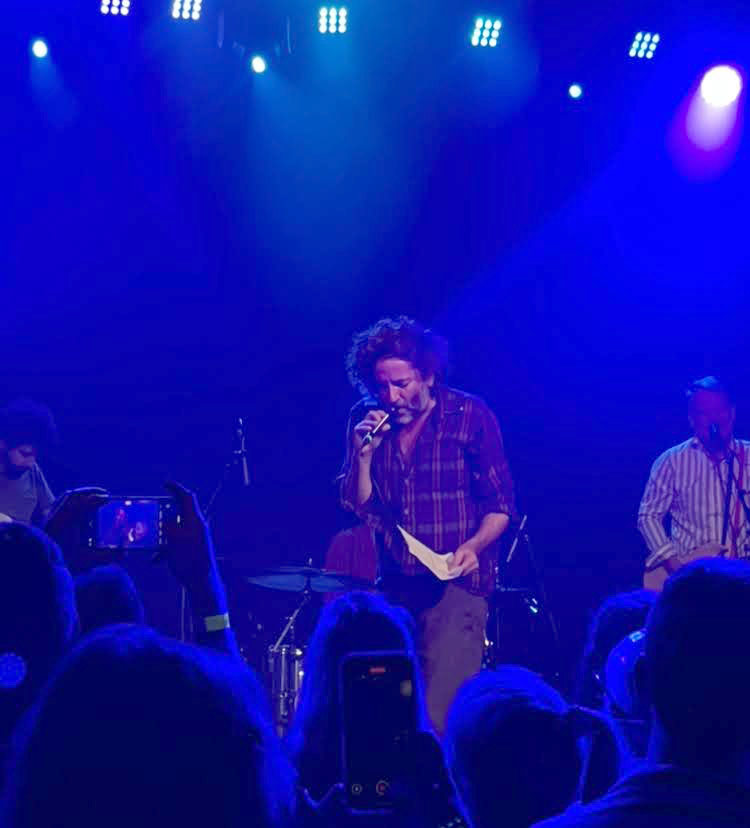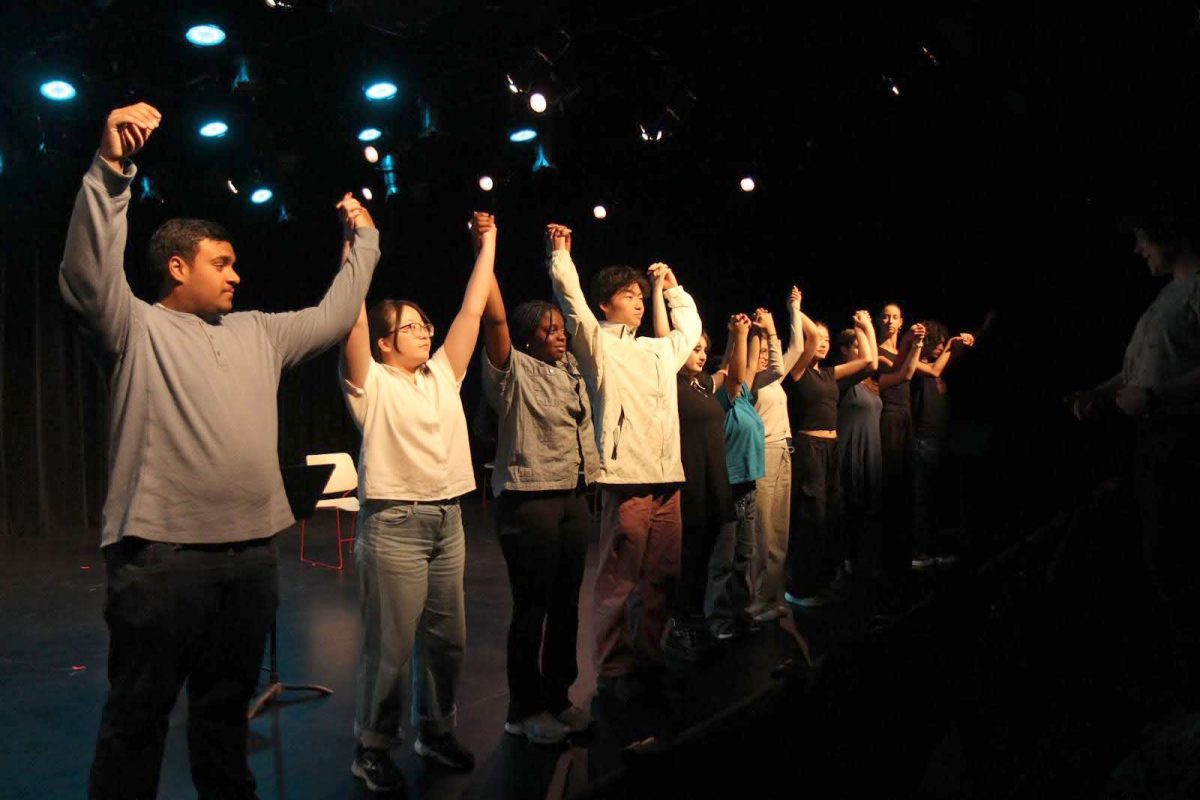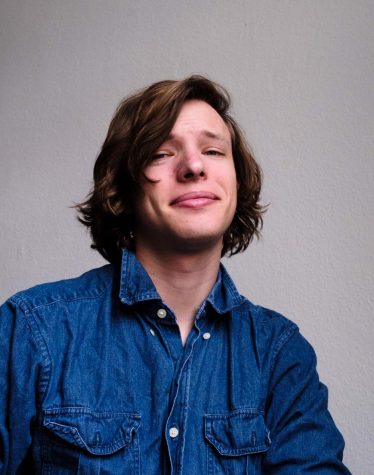Sohrab Mohebbi, a museum curator based in New York, began his conversation with artist Frances Stark at the Walker Art Center on Wednesday, September 26, by reading a poem:
I think I’ll Serve some toast today Oh no, there is no butter Perhaps I’ll find some jelly or jam Amidst the cupboard’s clutter Sadly to say there is no thing To spread upon my bread I’m forced to poke this knife Into my hungry head I bet inside there is mayonnaise And something like smoked ham My eyes can serve as olives To garnish the sandwich I am
Taken from Stark’s 1999 essay The Architect & the Housewife, around which much of the conversation was structured, this poem sets the tone for both the text and Frances herself. Playful, yet also constantly digging at something more profound.
Born in Los Angeles, California, Stark is an internationally exhibited artist. She has found success in a vast array of mediums, from digital prints and collages of excerpts from classic works of literature to full length video projects. Her art is displayed in galleries like the UCLA Hammer Museum, New York’s Museum of Modern Art, the Tate Museum in London and many more across the world.
In addition to her wildly varied artistic works, Stark is also an accomplished writer. Like her art, her writing is not constrained by a single topic. At first, the discussion of The Housewife seemed to be about its response to Daniel Buren’s 1979 essay The Function of the Studio (Buren’s installation Voile/Toile – Toile/Voile just recently came to Walker’s public SculptureCenter). Quickly, Stark began to cover a myriad of other subjects. The Housewife speaks of everything from the works of Emily Dickinson and Oscar Wilde to the topics of tattoos, consumerism and Ikea.
Stark’s reflection on her text was pushed further by Sohrab Mohebbi. Currently curator at SculptureCenter in Long Island, New York and formerly associate curator at REDCAT in Los Angeles, Mohebbi painted himself as a longtime admirer of Stark’s work, both written and artistic. He began by summarizing Buren’s idea of an artist’s studio as “Where the work originates, private, almost an ivory tower.” When a piece of art is taken from the studio, Buren says it is forced to make an unholy compromise between private and public or personal and political.
Stark disagrees. Recalling her life at the time of writing The Housewife, she said that she had no studio, instead working out of her apartment. Without expecting the apartment to be a location free from all outside influence, she found herself constantly coming and going, breaking these boundaries. Her studio was a place of domesticity and mundane life, constantly taking breaks to do chores or drive to target. “I was an artist but also just an American woman,” Stark said. She contrasted this with the global art world she found her colleagues participating in. “Famous LA artists never had their art in LA,” she recalled. She spoke about how large and impersonal art seemed to have become. She indicated that museums would raise millions of dollars for architectural installations and artists’ studios are beginning to look more and more like those of mainstream architects.
Although she made sure not to deride other forms of art, Stark thought that art could be more like how the great 20th century philosopher Ludwig Wittgenstein describes philosophy, not about building up buildings but rather tidying up rooms. Mohebbi and Stark related this quote again to what is normally viewed as domestic work done by the stereotypical housewife, marginalized and forgotten, private and un-political. At the end of the talk, both Stark and Mohebbi responded to a young art student’s question about financial stability in the art world.
Mohebbi commended all those who choose art as a vocation, saying “I think it’s true now more than ever that making art is an act of courage. You’ve chosen an irrational and impractical way of making meaning.”
Stark does not currently have a studio because she finds them too expensive. As when The Housewife was written and her studio was in her apartment, she sees the lack of boundary between work and life as something possibly freeing.
She responded to the question by saying that she values the ability of artistic youths to remain resourceful and flexible in the face of financial instability. An art career to her should not be a deterministic path, sacrificing quality and fetishizing art’s ability to make money. Artists can find the necessity for compromise between public and private, or political and personal, not as a curse but a source of inspiration, productivity, and passion. “At least I hope,” Stark said.








Owen Jackson • Sep 12, 2019 at 3:27 am
Good – I should certainly say I’m impressed with your website. I had no trouble navigating through all the tabs as well as related info. The site ended up being truly easy to access. Great job..
Sally Davidson • Sep 10, 2019 at 8:45 pm
Good day! Do you know if they make any plugins to help with Search Engine Optimization? I’m trying to get my blog to rank for some targeted keywords but I’m not seeing very good results. If you know of any please share. Kudos!
Matt Mackay • Sep 6, 2019 at 12:17 am
Good web site! I truly love how it is easy on my eyes it is. I am wondering how I might be notified when a new post has been made. I’ve subscribed to your feed which may do the trick? Have a great day!
Jerry Salido • Jul 23, 2019 at 11:45 am
Mass parsite http://bit.ly/2W9CVkn